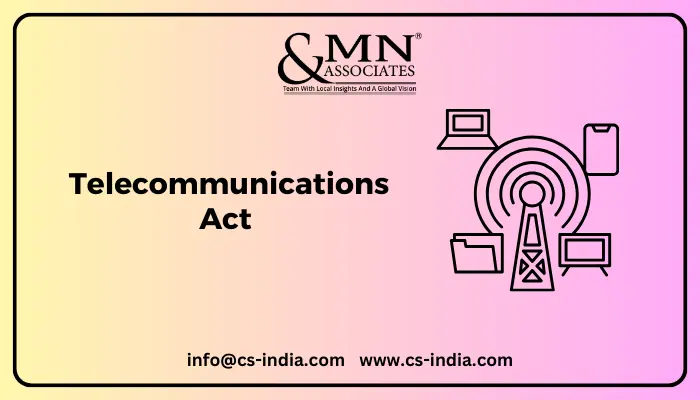
Telecommunications Act, 2023 – Ushering in a New Era for India’s Telecom Landscape
The Indian telecom sector is poised for a significant transformation with the enactment of the Telecommunications Act, of 2023. Replacing the antiquated Indian Telegraph Act of 1885, this new legislation aims to modernize the legal framework governing telecommunications, fostering innovation, competition, and user protection in the digital age.
Key Highlights of the Telecommunications Act:
- Authorization: Prior government authorization is mandatory for establishing or operating telecom networks, providing services, and possessing radio equipment. Existing licenses remain valid for their specified duration or five years, whichever is shorter.
- Spectrum Allocation: Spectrum, a crucial resource for telecom services, will be primarily assigned through auctions. However, specific entities like BSNL, MTNL, and those serving critical sectors like national security and disaster management will be exempt and receive administrative allocations.
- Interception and Search: The Act empowers authorities to intercept, monitor, or block communication under specific circumstances related to public safety, national security, and crime prevention, following defined procedures and safeguards.
- User Protection: The Act prioritizes user protection by empowering users to consent to receive specific messages (e.g., advertisements) and register for “Do Not Disturb” services to curb unwanted communication. Additionally, mechanisms are established for reporting malware and addressing grievances.
- Right of Way: Entities laying telecom infrastructure can seek the right of way over public and private property, facilitating network expansion.
- TRAI Appointments: The Act proposes amending the TRAI Act to enable individuals with extensive professional experience to serve as Chairperson and members, strengthening the regulatory body’s expertise.
- Universal Service Obligation Fund: The existing Universal Service Obligation Fund is renamed “Digital Bharat Nidhi” and its scope is expanded to encompass research and development in the telecom sector.
- Offenses and Penalties: The Act prescribes various criminal and civil offenses, with penalties ranging from imprisonment and fines for unauthorized activities to financial penalties for violating terms and conditions.
- Adjudication Process: An adjudicating officer and a Designated Appeals Committee are established to handle inquiries and appeals related to civil offenses under the Act.
Key Considerations and Potential Impact:
- Balancing Security and Privacy: The Act’s provisions for interception and search raise concerns about balancing national security imperatives with individual privacy rights. Robust safeguards and independent oversight are crucial to ensure these powers are not misused.
- Level Playing Field: While promoting competition is a stated objective, ensuring a level playing field for new entrants vis-à-vis established players with integrated infrastructure is critical.
- Data Protection: The Act does not explicitly address data protection, a critical aspect of the digital age. Aligning the Act with a comprehensive data protection framework is essential to safeguard user privacy and prevent misuse of sensitive information.
- Skilling and Governance: The Act’s success hinges on effective implementation, requiring investments in skilling the workforce and establishing a unified vision across different government departments for streamlined licensing, standard setting, and governance.
The Telecommunications Act, of 2023 presents a transformative opportunity for India’s telecom sector. By fostering innovation, ensuring competition, and prioritizing user protection, it can empower citizens, accelerate digital inclusion, and contribute significantly to the nation’s economic and social progress. However, addressing the concerns around security, privacy, and data protection, and creating a truly level playing field will be crucial to realizing the Act’s full potential.
For further information or legal consultations related to the Telecommunications Act, of 2023, please contact MN & Associates at info@cs-india.com.
Disclaimer:
MN & Associates is not affiliated with or endorsed by the Government of India or any of its agencies. The information provided in this blog post is based on publicly available sources and does not constitute an official interpretation of the Telecommunications Act, of 2023.
